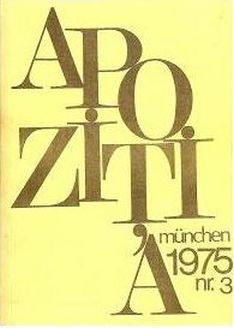The Ion Dumitru Collection was initiated and subsequently developed by the collector after he settled in the Federal Republic of Germany (FRG) in 1961. This private archive was continuously enriched between 1961 and 2003, when Ion Dumitru collected materials on the ways the Romanian exile community organised itself and acted, as well as documents relating to the activities of the collector and other personalities of the exile community between 1946 and 1989. At the same time, the collection is made up of a series of documents relating to the repressive and aberrant policies of the communist dictatorship, the political, cultural, social, and economic situation of communist Romania, its foreign policy, and the image of the country abroad. The Ion Dumitru collection is a useful source of information on the actions carried out by the communist authorities in Bucharest in order to counteract some of the initiatives of the exile community and of the way in which the same authorities perceived the Romanians in exile. Last but not least, the Ion Dumitru private archive is a valuable source for the post-1989 involvement of some personalities from the Romanian exile community in consolidating democracy in their native country.
A precious corpus of documents in the Ion Dumitru collection date from the time when he was still living in Romania, that is, from the period 1946–1961. All these documents were collected by Ion Dumitru after he emigrated to the FRG and settled in Munich in 1961. Their presence in the Ion Dumitru collection bears witness to the collector’s special interest in researching the activity and preserving the memory of the Romanian exile community in the postwar period. Most of the materials from the 1946–1961 period consist of exile publications, disparate and incomplete numbers, but extremely important because they help one to understand better the activity of the Romanian postwar exile community and to draw a profile of these newspapers and magazines and of the Romanians from abroad who published in their pages. Also, the importance of these publications resides in the analyses of the internal and international situation of communist, as well as postcommunist, Romania. These analyses are useful when one engages in a multifaceted historical reconstruction of that epoch. Over time, Ion Dumitru added new materials to his collection, especially publications on the situation of communist or post-communist Romania, which he collected before and after 1989. From this point of view, the Ion Dumitru Collection is the only one in the IICCMER archive which displays such a diversity of newspapers and journals of Romanians in exile, making it indispensable to any researcher concerned with Romania's recent history and, in particular, with the history of anticommunist exile. Of special importance are the publications of the Romanian Diaspora that emerged after 1990, reflecting the Romanians' preoccupation with their native country after the collapse of communism and containing a series of analyses and comments about Romania in the post-1989 period.
In addition to the publications already mentioned, the Ion Dumitru Collection also comprises documents that illustrate the continuous and diversified activity of the exile community, both politically and culturally, religiously, philanthropically, and journalistically. These are letters sent and received by the collector, and manuscripts of papers by Romanian emigrants that they sent to Ion Dumitru for publication by his publishing house. The Ion Dumitru Publishing House was one of the most important publishing houses of the Romanian emigration; over eighty books appeared under its imprint, volumes extremely important and valuable for Romanian history and culture. A significant number of these books focused on the communist regime in Romania. Among the most important topics addressed may be mentioned: the communist takeover in Romania, the repressive and aberrant policies undertaken by the communist authorities in Bucharest, and the foreign policy of the country. In addition, volumes of poetry and prose were also published. The Ion Dumitru Collection also includes a series of statutes, protocols, brochures, photographs, calls, and invitations that offer examples of actions taken both by the collector and by other Romanian personalities abroad, but also after the collapse of the communist regime in his native country.

